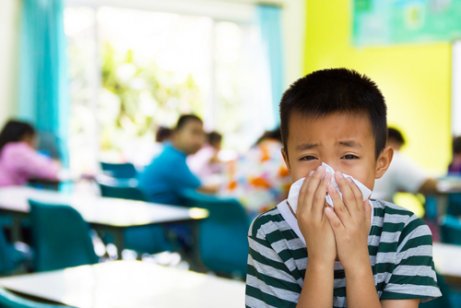Do Some Children Get Sick More Often Than Others?

These are some of the most common questions that parents ask pediatricians. This is especially true regarding school aged children.
When parents add up how many days their child missed school in the year, the number can be quite unsettling.
From the time children are born until around age 7, it’s common for them to get sick quite often. This is because their immune systems are still in a period of adaptation.
Rather than keeping track of how many times our child gets sick, we should pay attention to what this reveals about his or her overall health.
Do some children get sick more easily than others?
It’s true that children often get sick quite frequently. If you add up the number of times your child gets sick each year, you might think there’s some greater issue going on. You also might think that your little one gets sick more easily than other children.
However, you should avoid jumping to these conclusions. Rather, you should evaluate several factors that have to do with the innate characteristics of children. First of all, the average, healthy child gets sick at least 9 times per year with some respiratory virus.
Now, if your child is already in school, then your child may get sick some 12 or 13 times each year. The same is true if there is a smoker in your home.
As you can see, children are prone to get sick quite often. But all of this is considered normal even for overall healthy children.

How to recognize a serious illness
As we mentioned above, a healthy child between the ages of 1 and 7 can get sick some 9 times a year. This is due to his or her developing immune system or exposure to new pathogens.
So, how can parents know if their child is suffering from something more serious?
If your child presents some of the following symptoms in addition to common childhood illness, then you should speak to a medical professional:
- Constant diarrhea
- Constant skin fungi
- Growth problems
These symptoms may be an indication that your child has insufficient defenses.
The same is true if your child’s flu-like symptoms tend to worsen and turn into pneumonia or meningitis. Also, if antibiotics are ineffective against your child’s illness, then you may be looking at particular health problems that should be discussed with a specialist.
“From the time children are born until around age 7, it’s common for children to get sick quite often. This is because their immune systems are still in a period of adaptation”
The difference between allergic reactions and immunodeficiency problems
To determine if your child‘s frequent illnesses are due to immunodeficiency problems, there are a few things you need to know.
It’s important for you to know if your child’s body is truly unable to fight off viral agents. The same symptoms may simply be the result of allergies, so it’s important to know the difference.

Foods that help strengthen your child’s defenses
A complete and balanced diet will have a positive effect on your children’s overall health. This will help them protect themselves against viral illnesses or at least get over them more quickly.
If your child suffers from allergies, then you must take extra precaution with possible dietary restrictions or other necessary care. This will help to reduce the frequency of viral flare-ups.
Nutritionists recommend a daily intake of at least 2 servings of fruit and vegetables. You should focus especially on citrus fruits like oranges, lemons and tangerines.
Citrus fruits are rich in vitamin C, which is important for our immune systems.
You should also include nuts, cereals, and legumes at least 2 times a week. Your child should also consume yogurt, honey and plenty of liquid in order to maintain sugar levels. While an excess amount of sugar can be harmful, it’s important that your child’s diet includes a healthy amount.
So, is your child strong and energetic? Does he or she have a good appetite? Is he or she growing well?
If the answer to these questions is yes, and there are no alarming alterations in his or her health, then there’s no need to worry. Remember that frequent illness is normal in children during this stage of development.
These are some of the most common questions that parents ask pediatricians. This is especially true regarding school aged children.
When parents add up how many days their child missed school in the year, the number can be quite unsettling.
From the time children are born until around age 7, it’s common for them to get sick quite often. This is because their immune systems are still in a period of adaptation.
Rather than keeping track of how many times our child gets sick, we should pay attention to what this reveals about his or her overall health.
Do some children get sick more easily than others?
It’s true that children often get sick quite frequently. If you add up the number of times your child gets sick each year, you might think there’s some greater issue going on. You also might think that your little one gets sick more easily than other children.
However, you should avoid jumping to these conclusions. Rather, you should evaluate several factors that have to do with the innate characteristics of children. First of all, the average, healthy child gets sick at least 9 times per year with some respiratory virus.
Now, if your child is already in school, then your child may get sick some 12 or 13 times each year. The same is true if there is a smoker in your home.
As you can see, children are prone to get sick quite often. But all of this is considered normal even for overall healthy children.

How to recognize a serious illness
As we mentioned above, a healthy child between the ages of 1 and 7 can get sick some 9 times a year. This is due to his or her developing immune system or exposure to new pathogens.
So, how can parents know if their child is suffering from something more serious?
If your child presents some of the following symptoms in addition to common childhood illness, then you should speak to a medical professional:
- Constant diarrhea
- Constant skin fungi
- Growth problems
These symptoms may be an indication that your child has insufficient defenses.
The same is true if your child’s flu-like symptoms tend to worsen and turn into pneumonia or meningitis. Also, if antibiotics are ineffective against your child’s illness, then you may be looking at particular health problems that should be discussed with a specialist.
“From the time children are born until around age 7, it’s common for children to get sick quite often. This is because their immune systems are still in a period of adaptation”
The difference between allergic reactions and immunodeficiency problems
To determine if your child‘s frequent illnesses are due to immunodeficiency problems, there are a few things you need to know.
It’s important for you to know if your child’s body is truly unable to fight off viral agents. The same symptoms may simply be the result of allergies, so it’s important to know the difference.

Foods that help strengthen your child’s defenses
A complete and balanced diet will have a positive effect on your children’s overall health. This will help them protect themselves against viral illnesses or at least get over them more quickly.
If your child suffers from allergies, then you must take extra precaution with possible dietary restrictions or other necessary care. This will help to reduce the frequency of viral flare-ups.
Nutritionists recommend a daily intake of at least 2 servings of fruit and vegetables. You should focus especially on citrus fruits like oranges, lemons and tangerines.
Citrus fruits are rich in vitamin C, which is important for our immune systems.
You should also include nuts, cereals, and legumes at least 2 times a week. Your child should also consume yogurt, honey and plenty of liquid in order to maintain sugar levels. While an excess amount of sugar can be harmful, it’s important that your child’s diet includes a healthy amount.
So, is your child strong and energetic? Does he or she have a good appetite? Is he or she growing well?
If the answer to these questions is yes, and there are no alarming alterations in his or her health, then there’s no need to worry. Remember that frequent illness is normal in children during this stage of development.
This text is provided for informational purposes only and does not replace consultation with a professional. If in doubt, consult your specialist.








